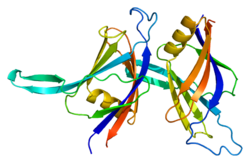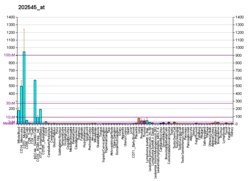PKCδ
PRKCD
Protein-coding gene in the species Homo sapiens
Protein kinase C delta type (or PKC-δ) is an enzyme that in humans is encoded by the PRKCD gene.[5]
Protein kinase C (PKC) is a family of serine- and threonine-specific protein kinases that can be activated by the second messenger diacylglycerol.[6] PKC family members phosphorylate a wide variety of protein targets and are known to be involved in diverse cellular signaling pathways. PKC family members also serve as major receptors for phorbol esters, a class of tumor promoters. Each member of the PKC family has a specific expression profile and is believed to play distinct roles in cells. The protein encoded by this gene is one of the PKC family members. Studies both in human and mice demonstrate that this kinase is involved in B cell signaling and in the regulation of growth, apoptosis, and differentiation of a variety of cell types.[7] Protein kinase C delta is also regulated by phosphorylation on various serine/threonine (e.g. T50, T141, S304, T451, T505, S506, T507, S643, S664) and tyrosine residues including Y311 (by SRC).[8][9]
PRKCD has been shown to interact with:
- "Human PubMed Reference:". National Center for Biotechnology Information, U.S. National Library of Medicine.
- "Mouse PubMed Reference:". National Center for Biotechnology Information, U.S. National Library of Medicine.
- Huppi K, Siwarski D, Goodnight J, Mischak H (June 1994). "Assignment of the protein kinase C delta polypeptide gene (PRKCD) to human chromosome 3 and mouse chromosome 14". Genomics. 19 (1): 161–2. doi:10.1006/geno.1994.1028. PMID 8188219.
- Kikkawa, Ushio (2002). "Protein Kinase Cδ (PKCδ): Activaton Mechanisms and Functions". The Journal of Biochemistry. 132 (6): 831–839. doi:10.1093/oxfordjournals.jbchem.a003294. PMID 12473183. Retrieved June 30, 2008.
- Welman A, Griffiths JR, Whetton AD, Dive C (December 2007). "Protein kinase C delta is phosphorylated on five novel Ser/Thr sites following inducible overexpression in human colorectal cancer cells". Protein Sci. 16 (12): 2711–5. doi:10.1110/ps.072874607. PMC 2222818. PMID 17965192.
- Storz P, Hausser A, Link G, Dedio J, Ghebrehiwet B, Pfizenmaier K, Johannes FJ (August 2000). "Protein kinase C [micro] is regulated by the multifunctional chaperon protein p32". J. Biol. Chem. 275 (32): 24601–7. doi:10.1074/jbc.M002964200. PMID 10831594.
- Keshamouni, V. G. (17 April 2002). "Mechanism of 17-beta -Estradiol-induced Erk1/2 Activation in Breast Cancer Cells. A ROLE FOR HER2 AND PKC-delta". Journal of Biological Chemistry. 277 (25): 22558–22565. doi:10.1074/jbc.M202351200. PMID 11960991.
- Braiman L, Alt A, Kuroki T, Ohba M, Bak A, Tennenbaum T, Sampson SR (April 2001). "Insulin induces specific interaction between insulin receptor and protein kinase C delta in primary cultured skeletal muscle". Mol. Endocrinol. 15 (4): 565–74. doi:10.1210/mend.15.4.0612. PMID 11266508.
- Rosenzweig T, Braiman L, Bak A, Alt A, Kuroki T, Sampson SR (June 2002). "Differential effects of tumor necrosis factor-alpha on protein kinase C isoforms alpha and delta mediate inhibition of insulin receptor signaling". Diabetes. 51 (6): 1921–30. doi:10.2337/diabetes.51.6.1921. PMID 12031982.
- Ren J, Li Y, Kufe D (May 2002). "Protein kinase C delta regulates function of the DF3/MUC1 carcinoma antigen in beta-catenin signaling". J. Biol. Chem. 277 (20): 17616–22. doi:10.1074/jbc.M200436200. PMID 11877440.
- Kumar V, Pandey P, Sabatini D, Kumar M, Majumder PK, Bharti A, Carmichael G, Kufe D, Kharbanda S (March 2000). "Functional interaction between RAFT1/FRAP/mTOR and protein kinase cdelta in the regulation of cap-dependent initiation of translation". EMBO J. 19 (5): 1087–97. doi:10.1093/emboj/19.5.1087. PMC 305647. PMID 10698949.
- Han JM, Kim JH, Lee BD, Lee SD, Kim Y, Jung YW, Lee S, Cho W, Ohba M, Kuroki T, Suh PG, Ryu SH (March 2002). "Phosphorylation-dependent regulation of phospholipase D2 by protein kinase C delta in rat Pheochromocytoma PC12 cells". J. Biol. Chem. 277 (10): 8290–7. doi:10.1074/jbc.M108343200. PMID 11744693.
- Yoshida K, Kufe D (December 2001). "Negative regulation of the SHPTP1 protein tyrosine phosphatase by protein kinase C delta in response to DNA damage". Mol. Pharmacol. 60 (6): 1431–8. doi:10.1124/mol.60.6.1431. PMID 11723252.
- Phillips-Mason PJ, Kaur H, Burden-Gulley SM, Craig SE, Brady-Kalnay SM (2011). "Identification of phospholipase C gamma1 as a protein tyrosine phosphatase mu substrate that regulates cell migration". J. Cell. Biochem. 112 (1): 39–48. doi:10.1002/jcb.22710. PMC 3031780. PMID 20506511.
- Hodgkinson CP, Sale GJ (January 2002). "Regulation of both PDK1 and the phosphorylation of PKC-zeta and -delta by a C-terminal PRK2 fragment". Biochemistry. 41 (2): 561–9. doi:10.1021/bi010719z. PMID 11781095.
- Brodie C, Steinhart R, Kazimirsky G, Rubinfeld H, Hyman T, Ayres JN, Hur GM, Toth A, Yang D, Garfield SH, Stone JC, Blumberg PM (July 2004). "PKCdelta associates with and is involved in the phosphorylation of RasGRP3 in response to phorbol esters". Mol. Pharmacol. 66 (1): 76–84. doi:10.1124/mol.66.1.76. PMID 15213298. S2CID 5774849.
- Leitges M, Gimborn K, Elis W, Kalesnikoff J, Hughes MR, Krystal G, Huber M (June 2002). "Protein kinase C-delta is a negative regulator of antigen-induced mast cell degranulation". Mol. Cell. Biol. 22 (12): 3970–80. doi:10.1128/mcb.22.12.3970-3980.2002. PMC 133855. PMID 12024011.
- Kristof AS, Marks-Konczalik J, Billings E, Moss J (September 2003). "Stimulation of signal transducer and activator of transcription-1 (STAT1)-dependent gene transcription by lipopolysaccharide and interferon-gamma is regulated by mammalian target of rapamycin". J. Biol. Chem. 278 (36): 33637–44. doi:10.1074/jbc.M301053200. PMID 12807916.
- Ali A, Hoeflich KP, Woodgett JR (2002). "Glycogen synthase kinase-3: properties, functions, and regulation". Chem. Rev. 101 (8): 2527–40. doi:10.1021/cr000110o. PMID 11749387.
- Slater SJ, Ho C, Stubbs CD (2003). "The use of fluorescent phorbol esters in studies of protein kinase C-membrane interactions". Chem. Phys. Lipids. 116 (1–2): 75–91. doi:10.1016/S0009-3084(02)00021-X. PMID 12093536.
- Brodie C, Blumberg PM (2003). "Regulation of cell apoptosis by protein kinase c delta". Apoptosis. 8 (1): 19–27. doi:10.1023/A:1021640817208. PMID 12510148. S2CID 19677299.
This article on a gene on human chromosome 3 is a stub. You can help Wikipedia by expanding it. |





